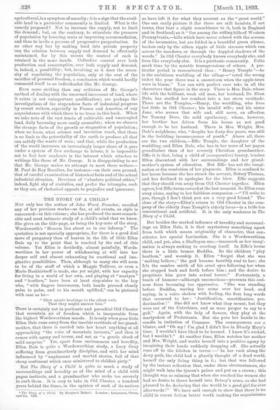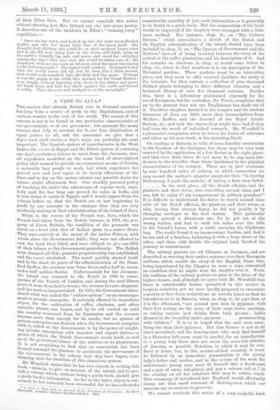THE STORY OF A CHILD.* NOT only has the author
of John Ward, Preacher, excelled any of her previous works—so far, at all events, as style is concerned—in this volume; she has produced the most remark- able and most intimate study of a child's mind that we know. She gives on the title-page, as being the key-note of the story, Wordsworth's "Heaven lies about us in our infancy." The quotation is not specially appropriate, for there is a good deal more of purgatory than of heaven in the life of little Ellen Dale up to the point that is reached by the end of this -volume. Yet Ellen is decidedly, almost painfully, Words- vrorthian in her power of withdrawing at will into her deeper self and almost exhausting its emotional and ima- ginative possibilities. Then, although to many she will seem to be of the stuff of which a Maggie Tulliver, or even a Marie Bashkirtseff is made, she yet might, with her capacity for living in a world of her own, and playing at " martyrs " and "heathen," have been at least step-sister to the boy who, " with fingers interwoven, both hands pressed closely palm to palm, and to his mouth uplifted," can be pictured with ease as he- " Blew mimic hootings to the silent owls
That they might answer him."
There is certainly not in puritanic and parochial Old Chester that mountain air of freedom which is inseparable from the highest Words worthian moods. It is only when poor little Ellen Dale runs away from the terrible rectitude of her grand- mother, that there is carried into her heart anything at all approaching "the voice of mountain torrents," and then it comes with agony and terror, and not as "a gentle shock of mild surprise." Yet, apart from environment and heredity, Ellen Dale is quite a Wordsworthian study, a Lucy Gray suffering from grandmotherly discipline, and with her mind influenced by "unpleasant and morbid stories, full of that cheap sentiment which once ministered to childish piety."
But The Story of a Child is quite as much a study of surroundings and heredity as of the mind of a child with pagan instincts, and a grandmother who seeks too severely to curb them. It is easy to take in Old Chester, a hundred years behind the times, in the .opinion of such of its natives The Store/ of a °hit& By Margaret Deland. London: Longmane, Green. and Co. 1592. as have left it for what they account as the "great world." One can easily picture it (for there are still hamlets, if not towns, that bear a slight resemblance to it, both in England and in Scotland) as it "lies among the rolling hills of Western Pennsylvania,—hills which have never echoed with the scream of the locomotive, but are folded in a beautiful green silence, broken only by the silken ripple of little streams which run across the meadows, or through the dappled shadows of the woods." In Old Chester everybody knows everybody else, and lives like everybody else. It is a puritanic community. Folks mark time by the notable transgressions of others. A par- ticular period is remembered thus Henry Temple "—he is the ambitious worldling of the village—" voted the wrong tieket the year there was a snowstorm when the apple-trees were in bloom." You can with perfect ease take in all the characters that figure in the story. There is Mrs. Dale, whose life with the brilliant, weak old man, her husband, Dr. Eben. Dale, has ossified her conduct into a too stern rectitude. There are the Temples,—Henry, the worldling, who lives but little in Old Chester ; his invalid wife ; and his sister Jane, who nurses that wife and, still more, an affection for Tommy Dove, the mild apothecary, whom, however, her brother has driven from his house as not good enough to be her husband. There is Mrs. Wright, Mrs. Dale's neighbour, who, "despite her forty-five years, was still in the bubbling inconsequence of youth." Above all, there are the two children,—Effie Temple, the daughter of the worldling, and Ellen Dale, who has in her more of her pagan grandfather than of her severely Christian grandmother. Effie it is that, being a child of (comparative) luxury, teaches Ellen discontent with her surroundings and her grand- mother's system of education. But Effie has not the imagi- nation or the resolution of her playmate. Ellen is confined to her house because she has struck the servant, Betsey Thomas, and has declined to apologise for the blow. Effie suggests that they should run away from Old Chester together. Ellen agTees,but Effie turns coward at the last moment. So Ellen runs away alone, saying to her faithless companion :—" I'll write to you, though I don't think you are a very good friend." The close of the story—Ellen's return to Old Chester in the com- pany of the elderly Jane Temple's elderly lover—is a trifle too conventional and artificial. It is the only weakness in The Story of a Child.
But besides the marked influence of heredity and surround- ings on Ellen Dale, it is that mysterious something apart from both which means originality of character, that con. stitutes her special fascination. She is a Wordsworthian child, and yet, also, a Shelleyan one,—inasmuch as her imagis nation is always seeking to overleap itself. In Effie's house there is a little bronze Buddha. So the children "play heathen," and worship it. Ellen "forgot that she was making believe ; ' the god became horribly real to her; she felt the sombre mirth of his cruel eyes following her when she stepped back and forth before him ; and the desire to propitiate him grew into actual terror." Fortunately, a touch of humour—although unconscious—prevents this eeri- ness from becoming too oppressive. "She was standing before Buddha, waving her arms over her head, and saying, in a voice shaken with feeling, the first long words that occurred to her : Justification, sanctification, pre- destination ! ' She did not know what they meant, but they were out of the Catechism, and so were proper to say to a god." Again, with the help of flowers, they play at the martyrdom of Protestants. But she puts her hands in the candle in imitation of Cranmer. The consequences are a blister, and "Oh my! I'm glad I didn't live in Bloody Mary's time. I wouldn't have liked to be burned. I know it's wicked, but I wouldn't." At another time, Ellen watches her mother and Mrs. 'Wright, and works herself into a positive agony by imagining their heads suddenly dropping off. She actually runs off to the kitchen in terror In her rush along the dewy path, the child had a ghastly thought of a dead world, herself the only living thing in it ; but that was followed by the instant reflection that, under these circumstances, she might walk into the Queen's palace and put on a crown ; this thought was so calming that when she reached the women she had no desire to throw herself into Betsey's arms, as she had planned to do, declaring that she would be a good girl for ever afterwards !" We have said enough to show that there is no child in recent fiction better worth making the acquaintance of than Ellen Dale. But we cannot conclude this notice without showing how Mrs. Deland can rise into prose poetry. It describes one of the incidents in Ellen's "running away" expedition :—
" Once she lay down, and looked up into the clear moon-flooded depths and into the broad kind face of the moon itself. She thought that children who could ho on their mothers' knees must feel as she did now, lying here in the warm still fields, lying on the earth's friendly lap, safe and warm, and oared for, swinging among the stars ! She was sure she would be taken care of ; she wondered, with not too keen an interest, what the moon was saying to the listening earth P She sighed with comfort. It seemed to her that she would never get up, but lie hero, like a little mound, that would melt somehow into the field and the grass. Perhaps it was the pagan in the child, this instinct for the Groat Mother ; very simply, without knowing why, there in the silence and peace she knelt down and laid her cheek against the earth and kissed it softly. Then she rose and trudged on in the moonlight."



































 Previous page
Previous page